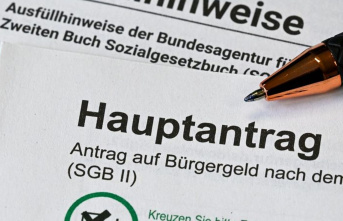The traffic light factions have agreed on changes to the citizens' income planned from January. As can be seen from a formulation aid available to the SPD, Greens and FDP parliamentary groups from the German Press Agency, the two-year waiting period for beneficiaries is said to be tightened.
It is planned, for example, that the heating costs during this time should only be covered to an appropriate extent. The original government draft did not provide for a limit on the assumption of costs at this point. This has been sharply criticized by the Union, among others, which had threatened to block social reform in the Bundesrat because of other points of criticism.
"We reacted quickly to the demands of the Bundesrat and will make numerous changes in the Bundestag that also correspond to the wishes of the federal states," said Federal Labor Minister Hubertus Heil (SPD) of the "Frankfurter Allgemeine Sonntagszeitung". "The reimbursement of heating costs, for example, is checked for adequacy so that no false incentives are set. And the job centers have more opportunities to take action against abuse of benefits." This means that the traffic light meets the demands of the Union.
Citizens' money is to replace Hartz IV
According to the plans of the federal government, the citizen's income is to replace the previous basic security system Hartz IV on January 1st. The aim is to put those affected in a position to be able to concentrate more on further training and looking for work. They should be put under less pressure by the job center. The standard rates of basic security should also increase by around 50 euros per month. Heil described the reform as "one of the biggest social reforms in 20 years".
The proposed changes to the waiting period also stipulate, for example, that beneficiaries may only move to a more expensive apartment during this period if the job center approves this beforehand. Originally, no prior authorization was provided for here. Something should also change when counting the waiting period: The year 2022 should also be allowed to be used when calculating the waiting period. "This means that the waiting period in cases in which benefits have been received without interruption since January 1, 2022 ends on December 31, 2023," says the draft. On this point, too, the federal states had previously warned of abuse and criticized the fact that the waiting period should only apply from January 2023 - and in some cases would have been longer than two years.
What is also new is that in future, in addition to declaring that they do not have significant assets, recipients of benefits will also have to enclose a self-assessment. This is also to prevent misuse of services. The Federal Employment Agency, which is to implement the reform in the shortest possible time, will also be given more generous transitional periods.
According to dpa information, the compromise proposal is to be approved by the parliamentary groups on Tuesday. Next Thursday, the Bundestag wants to deal with the reform in the second and third reading.
FDP politicians defend the compromise
The deputy FDP chairman, Johannes Vogel, said that the fact that recipients of citizen's income will only be able to claim heating costs in full in the future if they are reasonable is "a matter of course for fairness". The focus of the citizens' income reform is the goal "that the effort is more worthwhile than before," Vogel told the dpa. Vogel described many public statements in connection with the reform, such as the impression that benefit recipients are now exempt from sanctions, as "fake news".
His party colleague and parliamentary group spokesman for citizen money, Jens Teutrine, also defended the compromise. In particular, with the heating cost regulation, the traffic light factions stretched out a hand to the CDU-led countries, "which the Bundesrat should accept," Teutrine told the dpa. The next meeting of the Federal Council is scheduled for November 25th.
Green parliamentary group vice-president Andreas Audretsch called on the Union to give up its blockade of the Citizens' Income Act and to "stop making false statements". With their current revision, the traffic light factions have “taken up objective points of criticism from the Union”. She also has a responsibility to ensure that the reform can come into force on January 1st. Anything else would mean "chaos" for the job center, said Audretsch.












